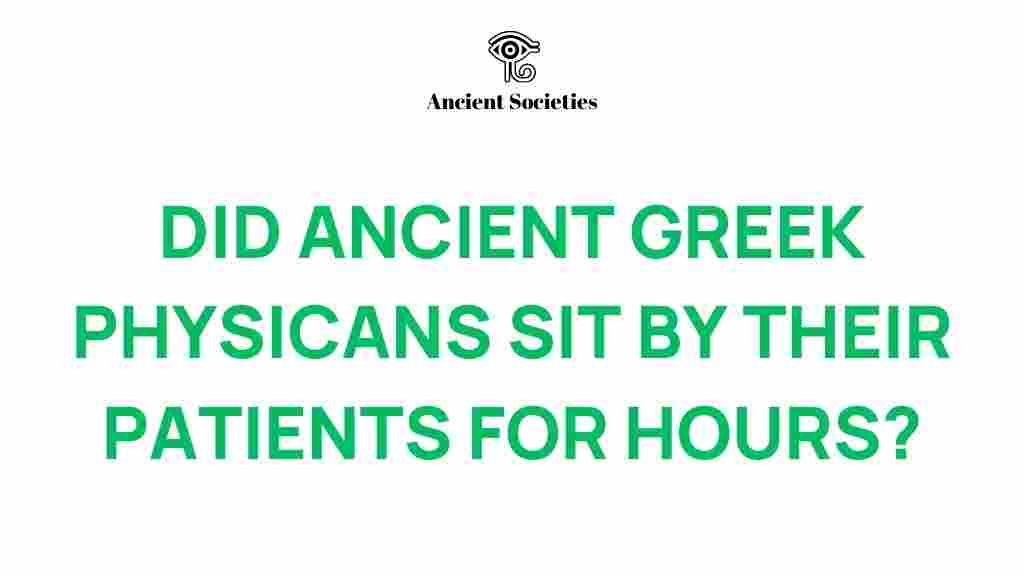Ancient Greece: Physicians and Their Approach to Patient Care
The history of medicine is a fascinating journey through time, and Ancient Greece stands out as a pivotal era that shaped modern medical practices. The physicians of Ancient Greece were not just healers; they were philosophers, theorists, and pioneers who laid the groundwork for many principles of medical ethics and the doctor-patient relationship we recognize today. This article delves deep into the healing practices of these ancient practitioners and explores the question: did they truly sit for hours with their patients?
The Role of Physicians in Ancient Greece
In Ancient Greece, physicians were highly regarded figures within society. They were seen as both healers and intellectuals, often involved in philosophical discussions about health, illness, and the human condition. The most notable physician of this time was Hippocrates, often referred to as the “Father of Medicine.” He and his contemporaries believed in observing patients closely to understand their ailments.
Healing Practices in Ancient Greece
The healing practices in Ancient Greece were a combination of practical medicine and spiritual rituals. Physicians employed various methods, including:
- Herbal remedies: Many physicians used plants and herbs to create medicines for their patients.
- Diet and lifestyle: They emphasized the importance of a balanced diet and a healthy lifestyle in maintaining good health.
- Physical therapy: Techniques such as massage and exercise were common, aiming to restore bodily function.
- Surgical procedures: Some physicians performed surgeries, although these were often rudimentary by modern standards.
These practices were deeply intertwined with the cultural and spiritual beliefs of the time, which often saw illness as a reflection of the gods’ displeasure or a disruption of the body’s natural balance.
The Doctor-Patient Relationship in Ancient Greece
The doctor-patient relationship in Ancient Greece was unique and significantly different from today’s practices. The ancient physicians often prioritized establishing a rapport with their patients. This included:
- Listening to patients: Physicians were expected to listen attentively to their patients’ symptoms and concerns.
- Consulting on lifestyle: They often discussed the patients’ daily lives, habits, and emotional states, understanding that these factors influenced health.
- Building trust: The relationship was built on trust, where the physician’s integrity and ethical standards played a crucial role.
While the exact duration spent with patients is debated, the emphasis on communication and relationship-building was clear. Physicians did not rush through consultations, and it was not uncommon for them to spend a substantial amount of time with patients to ensure a thorough understanding of their condition.
Did Ancient Greek Physicians Truly Sit for Hours with Patients?
The claim that Ancient Greek physicians spent hours with their patients is both supported and challenged by historical accounts. Here’s a breakdown of factors that contribute to this narrative:
- Philosophical traditions: The Greeks held a strong belief in the importance of dialogue and understanding in the healing process.
- Diagnosis methods: Physicians often needed to observe patients over time to accurately diagnose complex conditions, which could necessitate longer consultations.
- Individualized treatment: Each patient was treated uniquely, with detailed discussions about their health, lifestyle, and emotional well-being.
However, there were also practical limitations. In some cases, the time spent with patients could have been less than ideal due to the physician’s other commitments, including teaching or attending to multiple patients in a day.
The Influence of Medical Ethics
Medical ethics in Ancient Greece laid the groundwork for the ethical principles that guide healthcare today. The Hippocratic Oath, attributed to Hippocrates, emphasizes the ethical responsibilities of physicians. Key principles include:
- Confidentiality: Physicians were expected to keep patient information private.
- Non-maleficence: The commitment to do no harm was paramount.
- Beneficence: Physicians should act in the best interest of their patients.
These ethical considerations fostered a respectful and caring doctor-patient relationship that was vital for effective healing.
Challenges and Limitations in Ancient Greek Medicine
Despite their advanced understanding, Ancient Greek physicians faced numerous challenges:
- Lack of scientific methods: Many practices were based on observation and experience rather than controlled scientific experimentation.
- Limited medical knowledge: The understanding of diseases was rudimentary, and many conditions were poorly understood.
- Cultural beliefs: Superstitions and religious beliefs often interfered with rational medical practices.
These limitations meant that while physicians could provide substantial care, the effectiveness of their treatments varied widely.
Modern Interpretations of Ancient Practices
Today, the practices of Ancient Greek physicians are often revisited as we explore holistic approaches to medicine. The emphasis on patient care, communication, and the doctor-patient relationship resonates with modern-day healthcare values. The integration of emotional and psychological support in treatment plans reflects the ancient understanding that health encompasses more than just physical wellbeing.
For those interested in further exploring the historical context of these practices, consider visiting History.com for more detailed insights.
Conclusion: The Legacy of Ancient Greek Physicians
The physicians of Ancient Greece played a crucial role in shaping the history of medicine. Their holistic approach to patient care, emphasis on ethical practices, and dedication to building relationships with patients set a precedent that continues to influence modern medicine today. While the exact duration of their consultations may remain uncertain, what is clear is their commitment to understanding and healing their patients.
As we reflect on the healing practices of Ancient Greece, it is essential to recognize the value of the doctor-patient relationship and the ethical foundations that continue to guide healthcare. The lessons learned from these ancient physicians remind us that at the heart of medicine lies the profound human connection between healer and patient.
This article is in the category History and created by AncientSocieties Team

1 thought on “The Ancient Greek Physicians: Did They Truly Sit for Hours with Patients?”